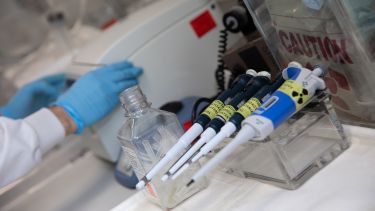Academic clinical fellowships
Running over three to four years, an academic clinical fellowship combines medical training with academic training.

How to apply
How to apply. ACF recruitment posts in round 1 for 2025 are almost complete. Any round 2 post will be advertised from April.
Click here to view the current fellowship vacancies
ACF posts are either Local Response (where the research will be aligned with the strengths of the department) or Theme posts where the research will be aligned with one of NIHR's priority themes. For further information on how the University of Sheffield's research fits into the NIHR themes, see our NIHR Academy IAT research themes page.
Contact catadmin@sheffield.ac.uk with any queries regarding this.
Why choose us?
- NIHR support for early career researchers within the Diabetes/Endocrinology theme have brought major benefits to the speciality here in Sheffield. Virtually all of those appointed to an ACF post have undertaken doctoral training, and most have continued to be active in clinical research. Those appointed as NIHR clinical lecturers have found senior clinical and academic positions either at this University or elsewhere.
- NIHR support for ACFs and ACLs has built research capacity in General Practice at Sheffield with good career progression in interdisciplinary health service research teams. In particular, we have worked with medical oncology and surgical oncology to develop innovative interdisciplinary training in NIHR priority themes Older Adults with Complex Care and Dementia for ACFs and ACLs in Oncology, GP and Surgery.
- The interdisciplinary University Flagships Institutes of Neuroscience and Healthy Lifespan were established with projected investment of £13.7M over 5 years. The Institute for Neuroscience is led from the purpose-built Sheffield Institute for Translational Neuroscience (SITraN) and focuses the expertise of over 120 translational, sensory, developmental and systems neuroscience researchers from the Engineering, Science and Medical faculties to improve prevention, diagnosis and treatment of degenerative, sensory and developmental neurological disorders.
- The Healthy Lifespan Institute (HELSI) collaborates with over 130 world-leading researchers from a range of disciplines to tackle the global epidemic of multi-morbidity and frailty with a mission to prevent or delay multi-morbidity, or to mitigate its effects.
- The University of Sheffield possesses expertise in infectious diseases, host immunity, antimicrobial resistance, emerging infections and global health. Professor Sarah Rowland-Jones co-leads the interdisciplinary Florey Institute, which studies the host/pathogen responses, including immunity.
- The clinical academic training programme at Sheffield has recently introduced an ACF pump-priming scheme. Trainees can apply for up to £2000 to fund work directly related to research aimed at a fellowship application.
Sheffield is the leading national centre for emergency medicine research, in terms of senior investigators, research income, peer-reviewed publications, and impact on the emergency care system.
Professor Steve Goodacre
Professor of Emergency Medicine
NIHR Academy IAT research themes
The NIHR funds clinical academic training for doctors and dentists through the Integrated Academic Training (IAT) Programme.
Academic clinical fellowships in South Yorkshire
- Sheffield has hosted academic clinical fellowships in over 35 specialities. The specialities offered at the ACF level vary each year but have recently included:
- Anaesthetics
- Cardiology
- Clinical Radiology
- Emergency Medicine
- Endocrinology/Diabetes
- ENT (Otolaryngology)
- Gastroenterology
- General Practice (Primary Care)
- General Psychiatry
- General Surgery (Surgical Oncology)
- Haematology
- Infectious Diseases
- Medical and Clinical Oncology
- Medical Microbiology and Virology
- Neurology
- Obstetrics & Gynaecology
- Paediatrics
- Renal Medicine
- Respiratory Medicine
- Trauma & Orthopaedics
- Urology
NIHR early oncology researchers have a great opportunity to work within the Sheffield Cancer Centre and gain experience in designing and running early-phase clinical trials. Ongoing exciting multi-million-pound funding initiatives unique to Sheffield and Yorkshire Cancer Research also provide an exciting platform for trainees to be involved in cancer research over the next 5 years.
Professor Janet Brown
Academic Training Programme Director, Chair in Medical Oncology
- What does the academic placement involve?
The ACF undergoes training in the generic skills required for a clinical academic: scientific methods, statistics, research governance, critical appraisal of research publication, grant writing etc. Modules are chosen from those provided for the MSc in Clinical Research or continuing professional development. Trainees can choose the modules most relevant to them.
The major part of the academic placement will be scientific research which can lead to a proposal for a PhD project, funding for which will be sought from an external body such as the NIHR, MRC or the Wellcome Trust.
Generally, the preparation of the proposal is based on preliminary experimental data gathered while on the research placement.
Who can apply for an ACF?
Individuals who have achieved competencies relevant to the level of the post advertised and can demonstrate that they have outstanding potential for development as a clinical academic in research and/or education. Individuals may have had previous clinical academic experience either at an undergraduate level (BMedSci) or postgraduate level (F2 Academic placement, MSc).
For more details on eligibility, see the NIHR IAT website.
Posts are generally offered at ST1 or ST3, depending on the speciality.
- Career paths
A successful ACF will obtain competencies relevant to their level of training and obtain external funding for a higher degree (research training fellowship). In the event that an ACF fails to obtain external funding for a higher degree or wishes to leave the clinical academic training pathway, they can apply to move into an available clinical position.
Case study
Dr Benjamin Lindsey describes his research interests, and the benefits of our Clinical Research Fellowship.
Features of the Sheffield programme
- All trainees can enrol on modules of the MSc in Clinical Research or take a selection of courses appropriate to their needs.
- All trainees have a bursary of £1000 a year to attend conferences and meetings specific to their research project area.
- A new competitive ACF pump priming scheme offers awards of up to £2000 to jump-start research.
- NHS England South Yorkshire and Bassetlaw holds an academic presentation day each year at which all trainees have the opportunity to present posters or give talks.
- The clinical academic programme holds an away day and gala dinner each year on a subject relevant to clinical academics.
- The Medical School provides a fellowship coaching scheme to help trainees prepare for their fellowship applications. This includes advice on applications and a mock interview geared to the style of the particular application being made.
Sheffield has a well-established Clinical Academic Mentoring Programme; recognising that clinical trainees have their own specific career development needs, this links trainees with mentors who are Clinical Academics themselves and who can help trainees with their research plans and help them balance the competing aspects of their lives and careers.
The opportunities have been amazing: formal teaching, research qualifications, direct support of my own research and particularly networking which has opened more doors. The ACF has broadened and enriched my career.
David Pallot
Academic Clinical Fellow in Emergency Medicine
Get in touch
For any further information or assistance, contact catadmin@sheffield.ac.uk
All posts are applied for through the NHS England South Yorkshire and Bassetlaw site, where an up-to-date list of available posts can be found.

